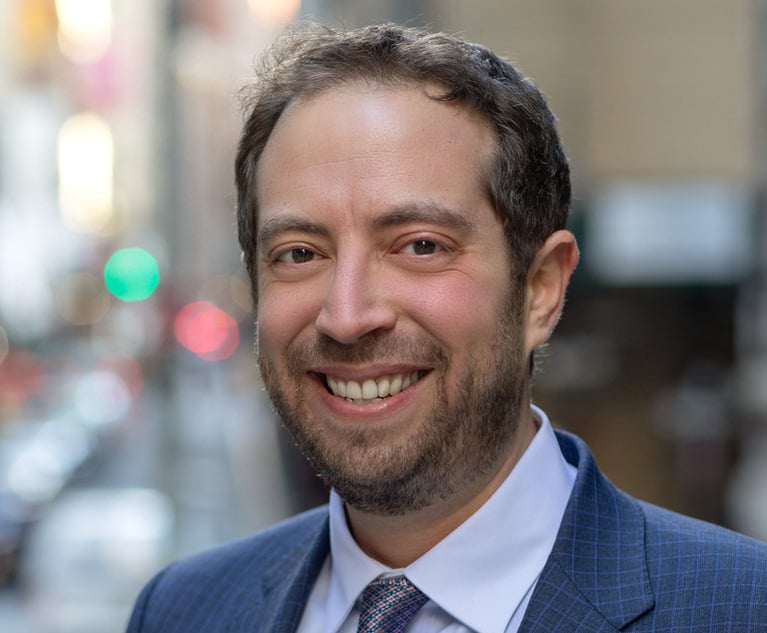Pioneering Law Blog Is Calling It Quits. Here's Why
The core group of law professors behind Concurring Opinions have gravitated toward other outlets for sharing their ideas, and participation in the blog has fallen off sharply. It will close down on Dec. 31.
December 20, 2018 at 01:19 PM
4 minute read
 Gerard Magliocca (Courtesy photo)
Gerard Magliocca (Courtesy photo)
Pour one out for Concurring Opinions, the group law professor blog that has been kicking around since 2006.
The blog will shutter Dec. 31, though the authors hope to preserve the archives. Concurring Opinions was among the first group law professors blog to emerge in the 2000s, when the new medium offered academics a much quicker way to disseminate their ideas than traditional law review publications. But blog participation among the core group of seven authors waned over time. Gerard Magliocca, a professor at Indiana University Robert H. McKinney School of Law, has written the vast majority of Concurring Opinions' posts over the past year and plans to continue blogging at Balkinization. Law.com caught up with Magliocca Thursday to discuss why Concurring Opinions is closing shop and whether legal blogs of its ilk have a future in a world dominated by Twitter, Facebook and podcasts. His answers have been edited for length and clarity.
Why close now? What happened?
The members have kind of moved on to other things or other media for getting out their views. We just decided that we didn't want to bring in a new group of people and start over from scratch. It has had a good run, and there really was no interest in continuing it.
Some of that probably relates to the existence of social media. People can get things out on Facebook and Twitter, and that's an alternative some people prefer. That wasn't around 10 years ago, really, or not to the extent it is now. Also, there are just other opportunities to get things out, whether it's writing for a website or having a personal website.
Legal blogs were a game-changer when they first came on the scene, right?
The existence of these blogs changed things in that they greatly sped up critiques of opinions, or discussions of issues. Take the case that came out of the District Court on the Affordable Care Act. Years ago, the opinion would come out and a few media outlets would write about it, but there wouldn't be any lengthy, formal analysis of it for months. Now, you get commentary about it in five seconds or as long as it takes someone to read the opinion. And you get a lot of it. You quickly get a consensus of what people think of it. That frames, I think to some degree, what an appellate court will think.
[Concurring Opinions] wasn't the first, but we were among the first. Some of them have become really well established. You've got SCOTUS Blog covering the Supreme Court, and the Volokh Conspiracy giving a more conservative—or libertarian—point of view on things. I just think that it's more to do with the preferences of our group, rather than a broader trend. The only broader trend is that there are more avenues to get your opinions out there. You can even do podcasts. You've seen more and more legal podcasts being done.
What reaction have you gotten since announcing the blog will close?
People have expressed gratitude for being able to read the posts. I've heard from people who have posted in the past as guest bloggers. There's a certain regret that it's going away, but it's more in the form of, “Thanks for what you've done.” It has reached its natural conclusion.
Does the group law professor blog format have a future?
It does have a future, but it only really works if there is a kind of brand identity. It could be it's about a particular subject—it's a place to read about copyright law or something. Or it has a particular political or ideological bent. But what I don't think you will see anymore is a collection of people blogging about general topics from different points of view. That's much harder to sustain just because it's harder to attract readers. You need some niche to fill in a way that a blog of generalists doesn't do.
This content has been archived. It is available through our partners, LexisNexis® and Bloomberg Law.
To view this content, please continue to their sites.
Not a Lexis Subscriber?
Subscribe Now
Not a Bloomberg Law Subscriber?
Subscribe Now
NOT FOR REPRINT
© 2025 ALM Global, LLC, All Rights Reserved. Request academic re-use from www.copyright.com. All other uses, submit a request to [email protected]. For more information visit Asset & Logo Licensing.
You Might Like
View All
How I Made Managing Partner: 'Educate Yourself About Law Firm Economics,' Says Gregory Hessinger of Mitchell Silberberg

How I Made Partner: 'Focus on Being the Best Advocate for Clients,' Says Lauren Reichardt of Cooley

How I Made Practice Group Leader: 'It’s a Job About People, First and Foremost,' Says Alexander Lees of Milbank
Trending Stories
Who Got The Work
J. Brugh Lower of Gibbons has entered an appearance for industrial equipment supplier Devco Corporation in a pending trademark infringement lawsuit. The suit, accusing the defendant of selling knock-off Graco products, was filed Dec. 18 in New Jersey District Court by Rivkin Radler on behalf of Graco Inc. and Graco Minnesota. The case, assigned to U.S. District Judge Zahid N. Quraishi, is 3:24-cv-11294, Graco Inc. et al v. Devco Corporation.
Who Got The Work
Rebecca Maller-Stein and Kent A. Yalowitz of Arnold & Porter Kaye Scholer have entered their appearances for Hanaco Venture Capital and its executives, Lior Prosor and David Frankel, in a pending securities lawsuit. The action, filed on Dec. 24 in New York Southern District Court by Zell, Aron & Co. on behalf of Goldeneye Advisors, accuses the defendants of negligently and fraudulently managing the plaintiff's $1 million investment. The case, assigned to U.S. District Judge Vernon S. Broderick, is 1:24-cv-09918, Goldeneye Advisors, LLC v. Hanaco Venture Capital, Ltd. et al.
Who Got The Work
Attorneys from A&O Shearman has stepped in as defense counsel for Toronto-Dominion Bank and other defendants in a pending securities class action. The suit, filed Dec. 11 in New York Southern District Court by Bleichmar Fonti & Auld, accuses the defendants of concealing the bank's 'pervasive' deficiencies in regards to its compliance with the Bank Secrecy Act and the quality of its anti-money laundering controls. The case, assigned to U.S. District Judge Arun Subramanian, is 1:24-cv-09445, Gonzalez v. The Toronto-Dominion Bank et al.
Who Got The Work
Crown Castle International, a Pennsylvania company providing shared communications infrastructure, has turned to Luke D. Wolf of Gordon Rees Scully Mansukhani to fend off a pending breach-of-contract lawsuit. The court action, filed Nov. 25 in Michigan Eastern District Court by Hooper Hathaway PC on behalf of The Town Residences LLC, accuses Crown Castle of failing to transfer approximately $30,000 in utility payments from T-Mobile in breach of a roof-top lease and assignment agreement. The case, assigned to U.S. District Judge Susan K. Declercq, is 2:24-cv-13131, The Town Residences LLC v. T-Mobile US, Inc. et al.
Who Got The Work
Wilfred P. Coronato and Daniel M. Schwartz of McCarter & English have stepped in as defense counsel to Electrolux Home Products Inc. in a pending product liability lawsuit. The court action, filed Nov. 26 in New York Eastern District Court by Poulos Lopiccolo PC and Nagel Rice LLP on behalf of David Stern, alleges that the defendant's refrigerators’ drawers and shelving repeatedly break and fall apart within months after purchase. The case, assigned to U.S. District Judge Joan M. Azrack, is 2:24-cv-08204, Stern v. Electrolux Home Products, Inc.
Featured Firms
Law Offices of Gary Martin Hays & Associates, P.C.
(470) 294-1674
Law Offices of Mark E. Salomone
(857) 444-6468
Smith & Hassler
(713) 739-1250









